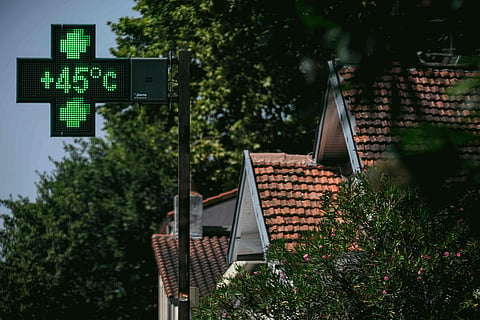Europe’s deadly heatwave and wildfires: Record temperatures, evacuations and climate impact
Record-breaking heat sparks evacuations, threatens historic sites

Dubai: A relentless heatwave is scorching Europe, pushing temperatures to deadly extremes and igniting devastating wildfires that are sweeping across multiple countries.
As record-breaking heat scorches cities from southern France to the Balkans, emergency services race against time to battle blazes threatening historic sites and forcing thousands to flee their homes.
In Italy, the brutal conditions have already claimed the life of a four-year-old boy, a tragic symbol of the mounting human cost amid this climate crisis unfolding in real time.
On Monday, southern France sweltered under temperatures soaring to 43 degrees Celsius (109.4 Fahrenheit), while Italy, the Balkans, Spain, and other regions battled extreme heat and rampant blazes.
Italy’s health ministry issued red alerts for major cities including Bologna and Florence, with some 11 cities on high alert for Tuesday and 16 on Wednesday. Southern France and parts of the Balkans were also placed on red alert due to soaring temperatures.
“The heatwave currently affecting France, Spain, and the Balkan countries is driven by a persistent heat dome over Europe,” said Akshay Deoras, a meteorologist at Britain’s University of Reading. “Heatwaves don’t roar like storms — they creep in quietly, but can be just as deadly.”
The heatwave’s deadly toll was underscored by the death of a four-year-old Romanian boy who succumbed to heatstroke after being found unconscious in his family’s car on the Italian island of Sardinia. Vulnerable populations face increasing risks as temperatures rise and summer drags on.
Alongside the brutal heat, wildfires have exploded across Europe, forcing thousands to evacuate. In northwestern Spain, a blaze damaged the UNESCO World Heritage-listed Roman-era mining site of Las Médulas, famed for its striking red landscape. The fire displaced around 700 residents, with firefighters battling high temperatures and winds gusting up to 40 kilometres per hour.
Suspected arson
Spain has endured a heatwave for over a week, with temperatures nearing 40°C in many areas, fueling persistent wildfires. In the southern tourist town of Tarifa, over 2,000 people, including tourists from hotels and beaches, were evacuated as a resurgent fire raged, with more than 100 firefighters working to contain the flames.
Portugal faces three large wildfires in its central and northern regions. Morocco has sent two aircraft to assist firefighting efforts after two Portuguese firefighting planes broke down. Italy’s Mount Vesuvius national park remains closed as firefighters and army personnel tackle a threatening blaze.
The Balkans are also heavily affected. In Albania, nearly 40 fires flared in 24 hours, with over 20 arrests linked to suspected arson. Montenegro and Croatia announced red alerts, and intense fires near Montenegro’s capital threatened dozens of homes. In Turkey’s Canakkale province, over 2,000 people were evacuated and dozens treated for smoke inhalation following multiple fires near the tourist village of Guzelyali.
Orange alert
Europe’s climate reality is stark. The UK-based Carbon Brief predicts 2025 will rank as the world’s second or third warmest year on record. Europe’s land temperatures have climbed about 2.3°C above pre-industrial levels — nearly twice the global average — fueling heatwaves and wildfires.
In France’s Aude department, firefighters continue to battle a massive wildfire that burned 16,000 hectares of vineyards and scrubland last week. Twelve French departments are on the country’s highest heat alert, with 41 others under orange alert, including neighboring Andorra. The heatwave is expected to last into mid-August, forcing officials to cancel events and close venues to protect public health.
Bulgaria is combating nearly 200 fires, including major blazes along borders with Greece and Turkey, supported by helicopters and aircraft from Sweden. Hungary set new national and city heat records, prompting a nationwide fire ban amid worsening drought.
This brutal heatwave and escalating wildfires underscore Europe’s rapid warming — the fastest on Earth — and the urgent challenges the continent faces in adapting to climate change while protecting lives, heritage, and ecosystems.
Sign up for the Daily Briefing
Get the latest news and updates straight to your inbox




